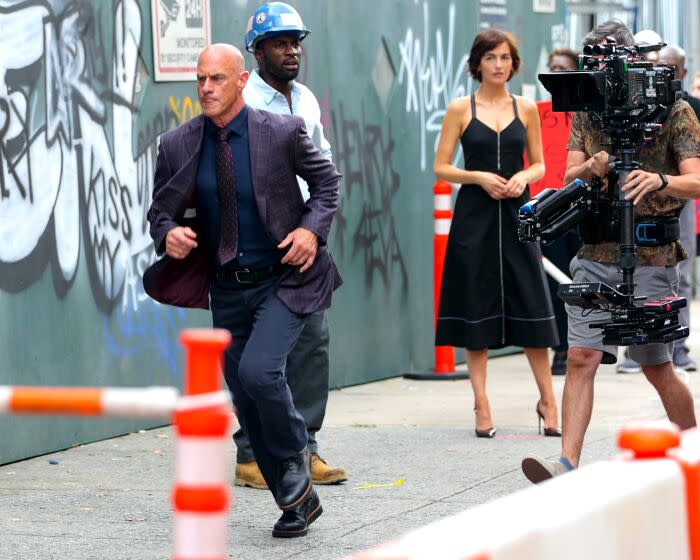Hazards of filming in cities all too real, location managers say

The shutdown last week of the Apple TV+ and Endeavor Content miniseries "Lady in the Lake" over reports that a crew member had been threatened stunned officials in Baltimore, a film-friendly hub where the acclaimed crime drama "The Wire" had filmed for years.
The Baltimore Police Department this week walked back its initial report of a violent threat on the set but arrested a street vendor, who officers said was upset that he had not been compensated by the production for lost business, on drug charges.
Nonetheless, the production halt was a reminder of the potential hazards that crews can face as they film in neighborhoods where they may not always be welcomed by residents and business owners.
"If you are in kind of rough neighborhoods, it can be difficult," said Chris Baugh, a location manager for 30 years. "I try to keep my wits about me."
Earlier this summer, threats or acts of violence disrupted filming in cities across the country, which Baugh and other location managers partly blame on rising crime and poverty amid the COVID-19 pandemic.
"I think more areas [I've seen] are slipping into poverty, and with that comes increased desperation," said Baugh, whose credits include the Oscar-winning film “Argo.” "And when you have desperation, and then you're right next to movie stars and prosperity, you're gonna become a target."
In July, a crew member on the TV series “Law & Order: Organized Crime” was shot to death in Brooklyn, N.Y. While details were unclear at the time, one co-worker said the man was involved in putting up fliers, cones and parking trucks for the production, according to the New York Post.
In another incident in Chicago last month, an incendiary device was thrown at a set of FX Network's revival of "Justified." The device did not explode, and no one was injured.
That came just three weeks after two drivers engaged in a gunfight smashed into set barricades while “Justified: City Primeval” was filming near Chicago’s Douglass Park. None of the crew members, who sought shelter as the shooters drove onto the set, were injured.
Baugh has had his fair share of close shaves on the job and stressed the need to be smart by diffusing potentially dangerous encounters.
When he first got into the industry in the early 1990s, Baugh was standing on a street corner in Boyle Heights taking photographs, scouting for murals around Mariachi Plaza for the PBS kids show "Reading Rainbow." He recalled putting his camera down and finding himself surrounded by gang members. He said he tried to ease the situation by talking his way out of it.
"Once they understood that I was scouting and just taking pictures, they thought it was fun and they wanted to be in it," said Baugh.
He recalled a more recent incident while working as a location manager on the Olivia Wilde movie "Don't Worry Darling" on election night 2020. Near the end of that day, the crew had to abruptly leave the film location near the Oviatt Building in downtown L.A. after police warned of an unruly crowd of demonstrators just blocks away.
"There wasn't a huge amount of damage, but the potential was there for something really serious," he recalled.
L.A.-based location manager Mike Fantasia, who has worked on films for Martin Scorsese and Steven Spielberg, said the rise in attacks to movie sets is making his job more difficult.
"You have to really consider where you're going to film," Fantasia said. "I think those that are marginalized are pissed, they're really upset. They look at people with $300,000 cameras, with a fantastic catering outfit, and they look at the time and the money we put into prepping and filming, wrapping locations and people pulling up in expensive cars, and they are thinking, 'Screw it. I'm gonna get a piece of this.'"
Some scouts, who must find suitable locations and negotiate with property owners to secure their permission to film, have had deadly encounters, Baugh noted.
In 2017, location scout Edward French was found with a gunshot wound near his vehicle at San Francisco's Twin Peaks viewpoint. French was approached by a young man and a woman before he was shot and his camera was stolen, CBS News quoted police reports. He was pronounced dead at a nearby hospital.
The same year, Mexican location scout Carlos Muñoz Portal was shot multiple times in a remote area in the central part of that country while scouting for Netflix’s hit show “Narcos," according to reports.
While filming can bring jobs and business to a location, not all communities are welcoming of productions they say cause too much disruption.
Last month, residents in Angelino Heights protested the filming of “Fast X,” the 10th installment in the car heist franchise, which they argue is encouraging street racing and illegal takeovers.
Some location managers have found ways to film in some of the most dangerous parts of cities for crime shows or movies.
When working in gang-heavy areas, "Training Day" and "Southland" location manager Michael Haro uses off-duty police to create a perimeter around the set and often seeks the help of inactive gang members through rehabilitation programs like Homeboy Industries to help enter their communities. They are offered roles as technical advisors on the productions, he said.
"The local neighborhood sees us, we hire their guys, they can get jobs and be legitimate for the time that we're there," Haro said. "It also gives us the ability to [show] the community, the kids that don't see any other thing than a lot of violence in the neighborhood, something new."
This story originally appeared in Los Angeles Times.

